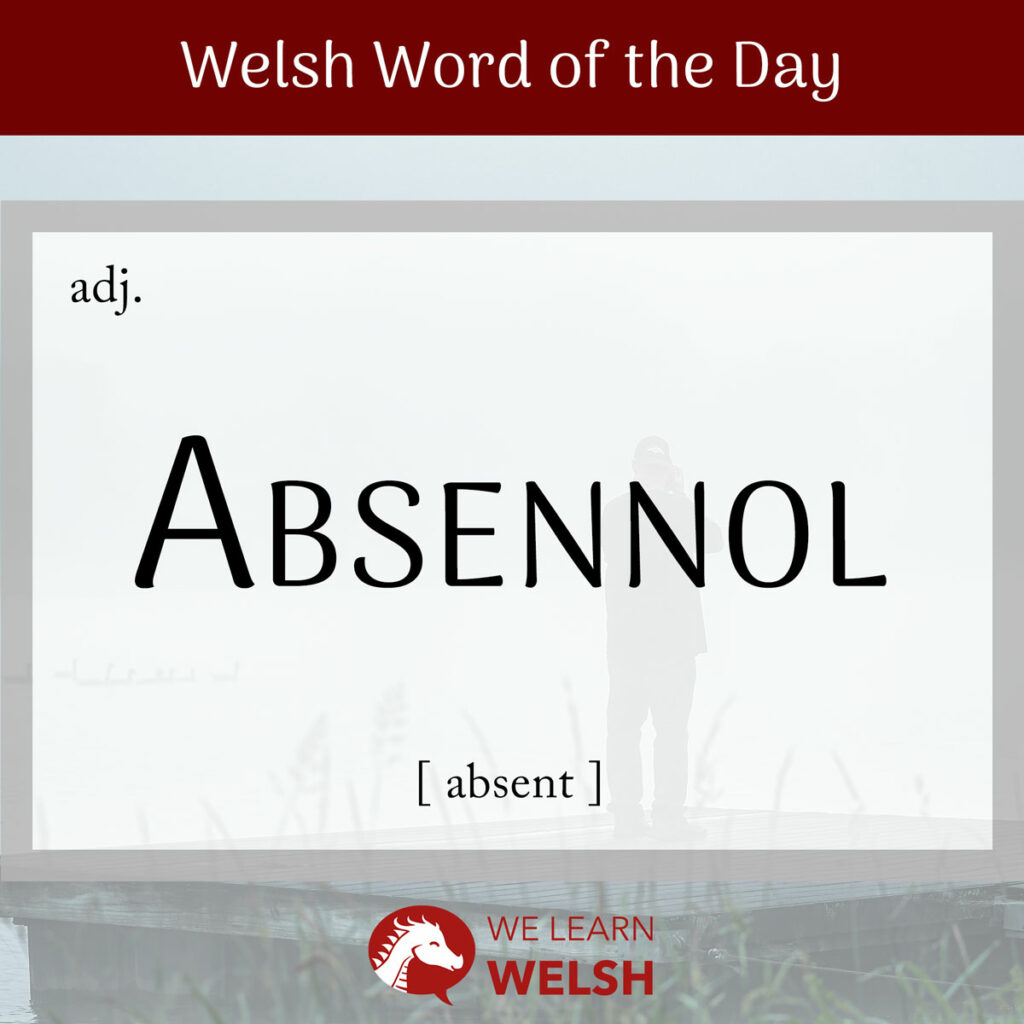I was mostly quite a good disgybl (pupil) in school. I got good grades in arholiadau (exams / assessments) and was polite to athrawon (teachers). However, I did have one serious weakness, which was my presenoldeb (attendance) record!
The Welsh word to describe my frequent days away from yr ysgol (school) is absennol (absent).
absennol
absent
Absennol is an easy word to memorise because it doesn’t have any variant forms. It’s pronounced the same way all over the country, it doesn’t mutate, and comparative versions are constructed by placing the words mor (equally as), mwy (more) and mwyaf (most) in front of the adjective, rather than by changing the word itself. And it remains the same whether you’re describing a masculine, feminine, or neutral noun. To top it all off, it sounds a lot like its English translation!
It also has a very simple etymology, being nothing more than an adjectival form of absen (absence).
Tracing it further back, absen made its way into Welsh via a borrowing from Latin, which is why it sounds like the English absent despite not being a loan-word. Interestingly it isn’t actually used much anymore – the longer form absenoldeb is the default.
Absenoldeb is a masculine noun. It can work as both an abstract and a countable noun; for example, if your child is like me, their athro (teacher) might contact you to complain about their absenoldebau!
I already mentioned presenoldeb (attendance or presence), which is absenoldeb’s antonym. Following the same pattern, the antonym of absennol itself is presennol.
Mae gen i ganiatâd i fod yn absennol yfory.
I have permission to be absent tomorrow.
Beyond absen and absenoldeb, other related words include absenolwr / absenolyn (an absentee), absenolion (absentees), absenoledd / absenoliaeth (absenteeism), absenoli (to absent, quite uncommonly used), and absenoliad (a synonym of absenoldeb).
If you’re the type to browse through dictionaries, you may think you’ve come across a few to add to this number, but a lot of these mean something quite different. That’s because absen actually has another old-fashioned meaning, which is the act of slander. It’s not unlikely that the two meanings are related to each other, with the possible link being the archaic phrase gair absen (a word in absence), which was once used to refer to speaking badly about someone behind their back.
For this reason, too, instances of absennol in historical Welsh texts have been found where it appears to be used to mean slanderous, but you certainly don’t need to worry about that in conversations today.
And absen as a translation for slander has now fallen out of use, just as much as it has as a synonym of absenoldeb, having been replaced by athrod (slander).
Dylid hyfforddi athrawon i gynorthwyo plant â rhieni absennol.
Teachers should be trained to support children with absent parents.
To describe specifically what someone is absennol from, you can use the preposition o (from or of).
O causes a soft mutation, although this is usually blocked by the intervention of a contracted form of yr (the), or sometimes a possessive pronoun. For example:
- absennol o’r gwaith = absent from work
- absennol o’r ysgol = absent from school
- absennol o’r tŷ = absent from the house
- absennol o’i deulu / absennol o’i theulu = absent from his / her family
- absennol o’i ddesg / absennol o’i desg = absent from his / her desk
You could also use it in the phrase mynd yn absennol (to be absent, to absent oneself). As I mentioned, the verb form absenoli is not that common, though perhaps you might see it in more formal language. Mynd yn absennol is more natural but will still be abandoned by many native speakers in favour of simply saying peidio mynd (not going) or cadw draw (keeping away).
Another handy expression is absennol ei feddwl, meaning absent-minded. It would be absennol ei meddwl for a female subject.
Notice it’s not absennol o’i feddwl, which would mean absent from his mind, although I suppose that would convey pretty much the same idea!


